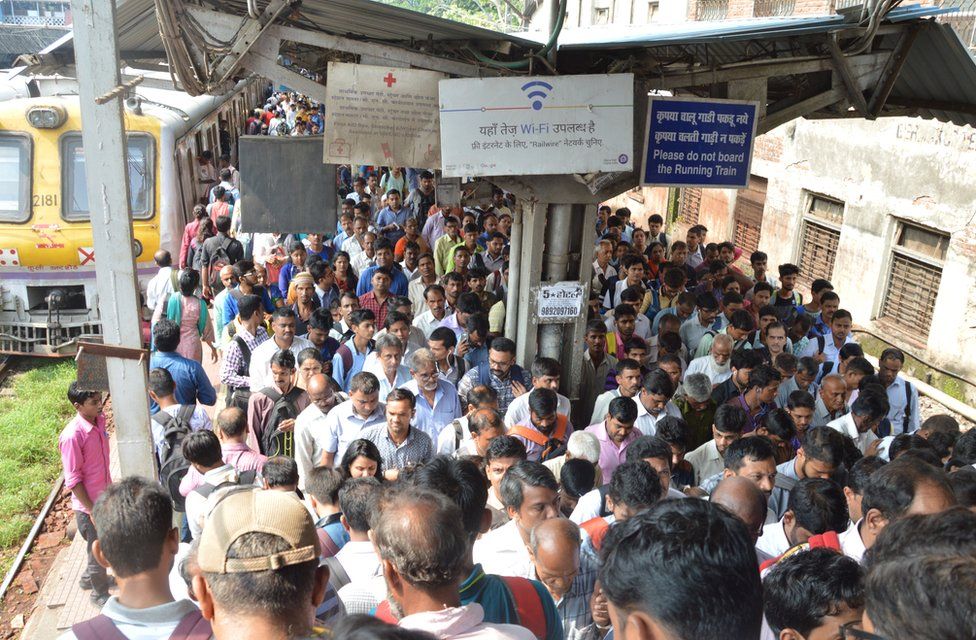Action, drama and emotion: Life inside Mumbai's local trains
- Published

It has been one month since 23 commuters died in a deadly stampede on a footbridge at a busy railway station in Mumbai. The BBC's Kinjal Pandya-Wagh, who has travelled on Mumbai's trains for more than a decade, writes about her experience.
Mumbai's local trains are the lifeline of the city. Carrying more than eight million people a day, it is impossible to imagine the city without its trains. They feature in documentaries, advertisements and even Bollywood movies.
But travelling on them is a whole other experience, not necessarily for the faint of heart.
I was in college when I started travelling on the local trains. It was a two hour commute to south Mumbai where I studied. I still remember the lights, the smell and the buzz around me each time the train entered the Chhatrapati Shivaji Terminus (CST) station in south Mumbai. It was all so exciting.
And eventually I became part of a community.
Unlike commuters in most other cities and countries, where travellers are often engrossed in their phones, commuters on Mumbai's local trains, over time, strike up conversations and build relationships. Given that they see each other every day for hours at a time, such relationships are in a way, inevitable.
It is not uncommon to find groups of commuters singing their favourite Bollywood songs or playing cards as they wile away the time. In the "ladies compartment", a coach reserved for women, many celebrate birthdays by passing around cake.
Groups of men in the "general compartment" are also known to sing spiritual songs using small hand cymbals called "manjiras".
Gossip is common, and almost nothing is off the table. People discuss their in-laws, moan about "office politics" and share salacious Bollywood stories.
I remember a woman in her late twenties summing up the modern working woman's struggle in India.
''I have told my mother-in-law very clearly that I am only going to cook once, in the morning," she said. "She has to make dinner for us as I can't manage that along with office work. She can't expect me to do everything along with work and this exhausting train journey.''
Rising tempers
But the coaches are so crowded , especially during peak hours, that fights are common. Commuters often push their way into the trains by throwing themselves forward and inevitably onto the person in front of them. This obviously leads to fights.
Some arguments end soon but others can go on until one of the parties get off the train. Swear words are used liberally. The verbal abuse can also turn physical, with people pushing, slapping or even pulling each other's hair.
I have had my shirt ripped more than once while getting onto a train because someone behind me was holding on to it to hoist themselves into the crowded coach.
Hanging on!
There have also been times when I have hung onto the footboard of the train, trying to push my way into a coach that was already packed with people. I had to scream to ask the women ahead of me to keep moving in so that I - and the other women also partly hanging out of the train - could get inside.
What is most shocking about the trains here, among the world's busiest, is that the doors don't close before the train starts moving.
Another challenge is that people have to board trains before they stop. I always timed my jump, leaping inside the coach and grabbing the handle of the door or the arm of another commuter to steady myself. If I am lucky enough to find a seat, I feel a sense of accomplishment.
If you don't find a spot to sit, you have to ask those who are seated which station they will be getting off at and then reserve the seat accordingly.
How you feel about such gruelling train travel depends on how you think about it. You could either love it or you could hate it.
It's taught me to be more tolerant and patient. These journeys bring people from different backgrounds together every day and they share a common goal: they want to reach their destination on time and alive.